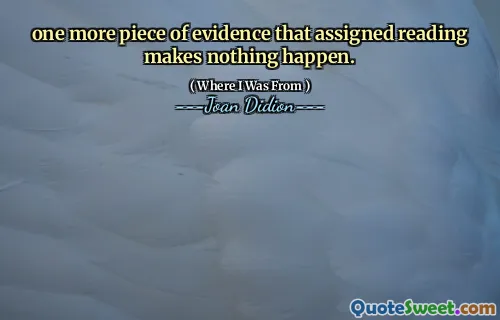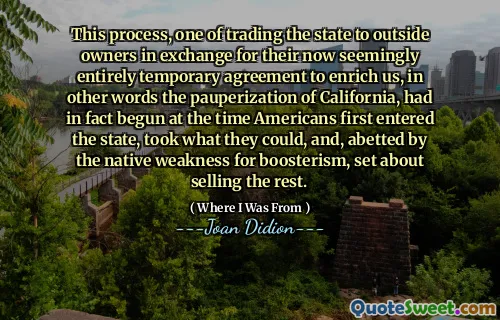
This process, one of trading the state to outside owners in exchange for their now seemingly entirely temporary agreement to enrich us, in other words the pauperization of California, had in fact begun at the time Americans first entered the state, took what they could, and, abetted by the native weakness for boosterism, set about selling the rest.
The quote reflects on the historical patterns of resource exploitation and economic inequality in California. Joan Didion, in '(Where I Was From),' often explores how societal narratives and optimism can mask underlying problems such as greed, materialism, and environmental degradation. This passage underscores a recurring theme: the idea that economic development, especially in frontier or rapidly changing regions like California, is often accompanied by a transfer of wealth—sometimes wielded by outside interests—ultimately leading to societal pauperization. The phrase 'trading the state to outside owners' highlights a classic form of early capitalism where local resources and land are commodified, frequently at the expense of the native populace or long-term sustainability. The notion that this process has been ongoing since the first American settlers emphasizes a historically embedded pattern of greed masked as progress. The term 'boosterism,' which refers to overselling or overly optimistic promotion of regional growth, suggests a cultural tendency to downplay or ignore the costs involved. The quote prompts reflection on how such practices have shaped modern California, influencing its socio-economic and environmental landscapes. It invites us to question whether contemporary development continues this tradition and to consider the moral implications of economic growth that benefits a few at the expense of many. Overall, it serves as a stark reminder that beneath the seemingly idyllic or prosperous image of California lies a complex history of exploitation and sacrifice, driven by a persistent desire to sell, expand, and profit.








